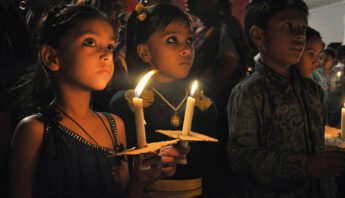FOR IMMEDIATE RELEASE: December 3, 2014
Press contacts:
Paul Towers, PAN North America, (916) 216-1082, ptowers@panna.org
Kimiko Martinez, NRDC, (310) 434-2344, kmartinez@nrdc.org
Honoring the victims of the Bhopal pesticide disaster, groups appeal to Governor Brown for action to protect children
After a decade of delay by the state, groups deliver over 12,000 petition signatures asking the Governor to show leadership and phase out the brain-harming pesticide chlorpyrifos
 Sacramento, CA — Thirty years after the Bhopal pesticide catastrophe killed more than 25,000 people, advocates in the health, environmental and workers’ rights sectors are calling on Governor Jerry Brown to protect California’s children by phasing out a toxic pesticide linked to developmental delays and IQ loss.
Sacramento, CA — Thirty years after the Bhopal pesticide catastrophe killed more than 25,000 people, advocates in the health, environmental and workers’ rights sectors are calling on Governor Jerry Brown to protect California’s children by phasing out a toxic pesticide linked to developmental delays and IQ loss.
The brain-harming pesticide chlorpyrifos is manufactured by Dow, the same corporation involved in the Bhopal disaster. Despite strong scientific evidence on health harms to children and more than a decade of review, California officials have yet to take steps that would provide needed protections for families, nor have they moved to phase out use of chlorpyrifos and accelerate adoption of safe farming practices.
“We honor the victims of Bhopal by ensuring another generation isn’t saddled with a toxic legacy,” said Sarah Aird, co-director of Californians for Pesticide Reform. “Governor Brown should push his agency to protect children from hazardous pesticides, starting with chlorpyrifos.”
California officials have been evaluating the continued use of chlorpyrifos since 2004, after the pesticide was nationally banned for household use in 2000. More than 1 million pounds of chlorpyrifos are applied in California annually, with heavy use on fruit and nut orchards, vineyards and row crops. Its widespread agricultural use means that people continue to be exposed through contaminated foods and drinking water, and from pesticides drifting from farmland into neighboring areas.
Dow, the primary manufacturer of chlorpyrifos, is also the owner of the Union Carbide facility that was involved in the 1984 pesticide disaster in Bhopal, India. As many as 25,000 people died then, and around 120,000 continue to be chronically ill 30 years after the incident. A survey suggests children born in the contaminated areas around the factory are more likely to have neurological damage than the average child in India.
In September, the California Department of Pesticide Regulation announced steps for tighter oversight of applications of Dow’s chlorpyrifos at the county level. But similar restrictions on other hazardous agricultural pesticides have not significantly reduced their use, so advocates are calling for more to be done. Earlier this year, California Department of Public Health officials documented chlorpyrifos use in close proximity to 438 public schools.
“Giving county officials more tools to monitor applications is a good step, but it can’t be a substitute for use restrictions such as large buffer zones,” said Anne Katten, MPH, pesticide and work safety specialist at California Rural Legal Assistance Foundation. “Even with more oversight, county officials regularly approve the use of hazardous pesticides like chlorpyrifos in close proximity to schools, workers and homes.”
Research from the University of California, Berkeley, University of California, Davis and Harvard University continues to link chlorpyrifos exposure to increased risk of ADHD, autism and falling IQs in children. In a recent UC Davis MIND Institute study, mothers who lived within one mile of chlorpyrifos applications during pregnancy had three times the risk of having children with autism.
“Chlorpyrifos is increasingly linked to adverse effects on children’s health and intelligence,” said Veena Singla, PhD, staff scientist at Natural Resources Defense Council. “Even in very small amounts, the pesticide can have profound impacts, especially during critical windows of a child’s development.”
The Union Carbide Gas Disaster in Bhopal is considered the worst industrial tragedy in history. Groups around the world regularly mark it and the following week as Day of No Pesticides and Week of No Pesticides, respectively.
“Governor Brown has the opportunity to play an international leadership role in protecting children from hazardous pesticides,” said Medha Chandra, PhD, campaign coordinator at Pesticide Action Network. “We can’t afford to wait any longer — the Governor can and must act now to protect the potential of this generation.”
Resources:
- Chlorpyrifos fact sheet
- Report from California’s Department of Public Health showed that chlorpyrifos was one of the top 10 most frequently detected pesticides applied within a quarter mile of schools in California
- Map documenting where chlorpyrifos is used
- List of foods with documented chlorpyrifos residue
###
Pesticide Action Network North America (PAN North America, or PANNA) works to replace the use of hazardous pesticides with ecologically sound and socially just alternatives. As one of five PAN Regional Centers worldwide, we link local and international consumer, labor, health, environment and agriculture groups into an international citizens’ action network. This network challenges the global proliferation of pesticides, defends basic rights to health and environmental quality, and works to ensure the transition to a just and viable society. Visit us at www.panna.org and follow us on Twitter @pesticideaction
Natural Resources Defense Council (NRDC) is an international nonprofit environmental organization with more than 1.4 million members and online activists. Since 1970, our lawyers, scientists, and other environmental specialists have worked to protect the world's natural resources, public health, and the environment. NRDC has offices in New York City, Washington, D.C., Los Angeles, San Francisco, Chicago, Livingston, Montana, and Beijing. Visit us at www.nrdc.org and follow us on Twitter @NRDC.







